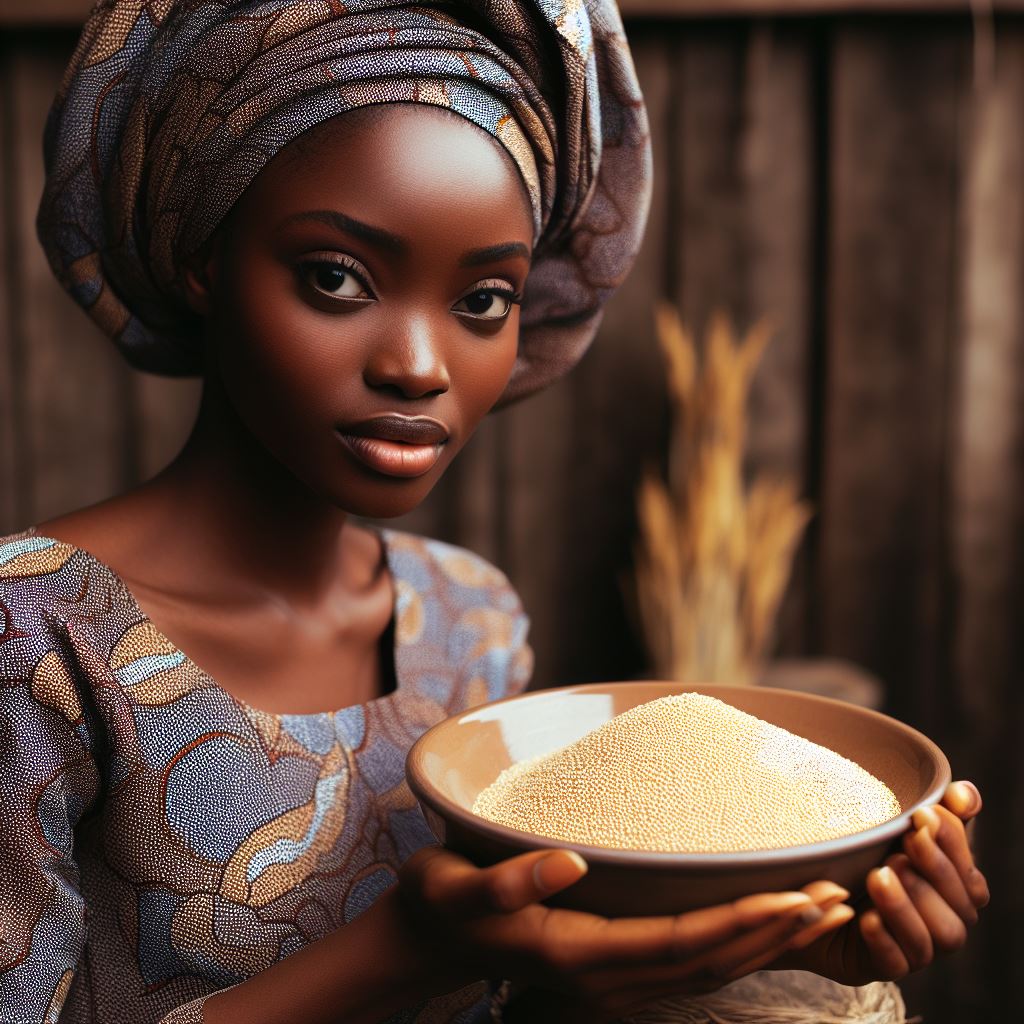Introduction
A. Importance of Minerals in the Diet
Minerals are vital for overall health, contributing to bone strength, immune function, and energy production.
B. Abundance of Traditional Nigerian Grains
Nigeria boasts a rich tapestry of grains, each brimming with essential minerals crucial for well-being.
C. Preview of Main Points
- Sorghum’s Magnesium Boost: Enhance your magnesium intake with sorghum, promoting heart health and muscle function.
- Iron-Rich Millet: Dive into millet’s iron content, combating anemia and supporting oxygen transport in the body.
- Zinc-Packed Fonio: Unearth the zinc treasure in fonio, fortifying the immune system and promoting skin health.
- Calcium from Guinea Corn: Guinea corn emerges as a calcium source, crucial for bone density and nerve function.
- Overview of Posts: Stay tuned for in-depth explorations of each grain, unlocking their nutritional secrets for a healthier you.
Overview of Traditional Nigerian Grains
Traditional Nigerian grains, including millet, sorghum, and maize, are integral to Nigerian cuisine.
These nutritious grains have been a staple in the Nigerian diet for centuries, providing essential nutrients and contributing to the country’s food security.
A. Millet
Millet is a powerhouse grain known for its high nutrient content.
It is an excellent source of carbohydrates, providing sustained energy for the body.
Additionally, millet is rich in proteins, fiber, calcium, iron, magnesium, and phosphorus.
This grain offers numerous health benefits. Its high fiber content promotes healthy digestion, prevents constipation, and reduces the risk of gastrointestinal disorders.
Millet also contains antioxidants that help protect the body against oxidative stress and chronic diseases such as heart disease and cancer.
B. Sorghum
Sorghum is another traditional Nigerian grain with impressive nutritional benefits.
It is packed with essential minerals like iron, phosphorus, potassium, and calcium.
Sorghum also contains vitamins B and E, which are essential for overall health.
This grain’s high antioxidant content helps combat free radicals, reducing the risk of inflammation and chronic diseases.
Sorghum also aids in maintaining a healthy cardiovascular system by lowering cholesterol levels and regulating blood pressure.
C. Maize
Maize, commonly known as corn, plays a significant role in Nigerian cuisine.
Unlock the Power of Nigerian Food Minerals
Discover personalized Food Advisory tailored to boost your health or business using expert insights on Nigerian minerals.
Get StartedIt is a versatile grain used in various dishes and offers a multitude of health benefits.
Maize is rich in carbohydrates, providing a quick source of energy.
In addition to carbohydrates, maize contains essential vitamins such as thiamine (vitamin B1) and folate (vitamin B9).
These vitamins are crucial for proper brain function, energy production, and the synthesis of red blood cells.
Maize also boasts a good amount of dietary fiber, promoting healthy digestion, weight management, and lowering the risk of chronic diseases, including type 2 diabetes and colon cancer.
To sum it up, traditional Nigerian grains like millet, sorghum, and maize are valuable sources of essential nutrients.
They contribute significantly to Nigerian cuisine and play a vital role in maintaining good health.
Including these grains in your diet can provide sustained energy, improve digestion, boost immunity, and reduce the risk of chronic diseases.
Embracing these nutrient powerhouses can lead to a healthier and more balanced lifestyle.
Read: Exploring Mineral-Packed Soups of Nigeria’s Regions
Minerals Found in Traditional Nigerian Grains
Traditional Nigerian grains are not just staple foods, they are also powerhouses of essential minerals that are vital for maintaining a healthy body.
In this section, we will explore the different minerals commonly found in traditional Nigerian grains, their importance, and specific examples of grains that are rich sources of each mineral.
A. Calcium
- Millet: Millet is not only a great source of calcium but also provides other essential minerals.
- Sorghum: Sorghum is known for its high calcium content, making it beneficial for bone health.
B. Iron
- Millet: Millet is a rich source of iron, which is crucial for the production of red blood cells.
- Sorghum: Sorghum also contains significant amounts of iron, helping to prevent iron deficiency.
C. Magnesium
- Sorghum: Along with calcium and iron, sorghum is a good source of magnesium, which is essential for various bodily functions.
- Millet: Millet contains magnesium that aids in maintaining a healthy immune system and nerve function.
D. Zinc
- Maize: Maize is a traditional Nigerian grain that is packed with zinc, supporting immune system function.
- Millet: Millet also provides zinc, which contributes to cell growth and repair.
E. Phosphorus
- Rice: Rice, a widely consumed grain in Nigeria, is an excellent source of phosphorus, promoting bone health and energy production.
- Millet: Millet is another grain rich in phosphorus, helping to maintain dental health and strong bones.
F. Potassium
- Guinea Corn: Guinea corn is a traditional grain that is abundant in potassium, supporting heart health and blood pressure regulation.
- Millet: Millet also contains potassium, important for nerve and muscle function.
G. Fiber
- Brown Rice: Brown rice is a fiber-rich grain that aids in digestion and helps prevent constipation.
- Millet: Millet contains dietary fiber that promotes a healthy digestive system and prevents digestive disorders.
Each of these minerals plays a crucial role in maintaining overall health and well-being.
Calcium ensures strong bones and teeth, while iron prevents anemia and boosts energy levels.
Captivate Your Audience with Exclusive Nigerian Food Content
Imagine your platform enriched with unique, mineral-rich Nigerian cuisine stories that no one else can offer. Let's create content that resonates deeply and sets you apart.
Get StartedMagnesium supports nerve and muscle function, while zinc aids in wound healing and boosts the immune system.
Phosphorus promotes cell repair and energy production, and potassium helps maintain a healthy heart and blood pressure.
Additionally, fiber is essential for good digestion and can help prevent various digestive disorders.
As you can see, traditional Nigerian grains are not only delicious but also provide a natural and abundant source of these essential minerals.
Incorporating these grains into your diet can help you meet your daily mineral requirements and promote optimal health.
So the next time you sit down to a traditional Nigerian meal, remember the power of these grains and the minerals they provide!
Read: Nigerian Seafood Dishes: A Treasure of Minerals

Health Benefits of Consuming Traditional Nigerian Grains
Traditional Nigerian grains have been a staple food in the country for centuries, providing not only sustenance but also a myriad of health benefits.
In this blog section, we will examine the various health benefits associated with consuming traditional Nigerian grains and explain how the minerals present in these grains contribute to these benefits.
Additionally, we will discuss the role of these grains in preventing mineral deficiencies in the Nigerian diet.
A. Improved Digestive Health
Consuming traditional Nigerian grains such as sorghum, millet, and fonio can greatly enhance digestive health due to their high fiber content.
Fiber aids digestion, prevents constipation, and promotes regular bowel movements.
B. Enhanced Heart Health
The minerals present in traditional Nigerian grains, such as magnesium and potassium, play a crucial role in maintaining a healthy heart.
These grains help lower blood pressure, reduce the risk of heart disease, and improve overall cardiovascular health.
C. Diabetes Management
Traditional Nigerian grains have a low glycemic index, making them an excellent choice for individuals with diabetes.
They help regulate blood sugar levels and prevent sudden spikes, thus contributing to better diabetes management.
D. Weight Management
Incorporating traditional Nigerian grains in your diet can aid in weight management.
These grains are low in calories and rich in fiber, which promotes a feeling of fullness and helps control appetite, ultimately leading to weight loss or maintenance.
E. Strengthened Bones and Teeth
The abundant minerals found in traditional Nigerian grains, such as calcium and phosphorus, are vital for strong bones and teeth.
Regular consumption of these grains can prevent bone-related disorders and promote healthy teeth.
F. Boosted Energy Levels
Traditional Nigerian grains are a great source of complex carbohydrates, providing sustained energy throughout the day.
They are digested slowly, preventing energy crashes and maintaining optimal energy levels.
G. Improved Brain Function
The minerals present in traditional Nigerian grains, including iron, zinc, and magnesium, support proper brain function.
These grains contribute to improved cognitive abilities, memory retention, and overall brain health.
H. Preventing Mineral Deficiencies
Traditional Nigerian grains play a crucial role in preventing mineral deficiencies in the Nigerian diet.
The minerals found in these grains, such as iron, zinc, and calcium, help bridge the gap between nutrient requirements and intake.
Consuming traditional Nigerian grains offers a multitude of health benefits, ranging from improved digestive health to preventing mineral deficiencies
Incorporating these grains into your diet not only adds variety but also promotes overall well-being.
So, make sure to include sorghum, millet, fonio, and other traditional grains in your meals for a healthier and more nutritious lifestyle.
Read: Zinc-Rich Foods: Boosting Immunity in Nigeria
Incorporating Traditional Nigerian Grains into the Diet
Nigerian cuisine is known for its diverse flavors and rich traditional dishes.
One aspect that makes Nigerian food unique is the incorporation of traditional grains.
These grains not only add texture and taste to meals but also pack a nutritional punch.
In this section, we will explore the benefits of traditional Nigerian grains and provide tips, ideas, and recipes to incorporate them into your daily meals.
A. Millet: A Versatile Grain
Millet is an ancient grain that has been a staple in Nigerian cuisine for centuries.
It is rich in minerals like iron, magnesium, and phosphorus.
Here are some ideas to incorporate millet into your diet:
- Swap out rice with millet in your favorite pilaf or stir-fry recipe.
- Use millet flour to make delicious gluten-free pancakes or bread.
- Add cooked millet to soups and stews for an extra dose of fiber and nutrients.
B. Sorghum: The Nutritional Powerhouse
Sorghum is another traditional grain that is highly nutritious and gluten-free.
It is loaded with antioxidants, fiber, and protein.
Here are some ways to incorporate sorghum into your meals:
- Cook sorghum and use it as a base for grain bowls or salads.
- Make sorghum flour pancakes, muffins, or cookies for a healthier twist on your favorite baked goods.
- Add popped sorghum to trail mix or sprinkle it over yogurt for a crunchy snack.
C. Fonio: A Tiny Grain with Big Benefits
Fonio, a small grain native to West Africa, is gaining popularity for its nutritional value.
It is a good source of fiber, protein, and essential amino acids.
Here are some ways to incorporate fonio into your diet:
- Cook fonio and use it as a substitute for couscous or rice in pilafs and salads.
- Make fonio porridge by cooking it with milk or plant-based milk and adding your favorite toppings like fruits and nuts.
- Use fonio flour in baking to make nutritious bread, muffins, or pancakes.
D. Teff: The Ancient Grain
Teff is a tiny grain that has been a staple in Ethiopia for centuries.
It is now gaining popularity worldwide due to its health benefits.
Teff is high in fiber, iron, and calcium.
Here are some ideas to incorporate teff into your meals:
- Cook teff and use it as a base for porridge or as a side dish.
- Use teff flour to make gluten-free bread, pancakes, or cookies.
- Add teff to soups and stews as a natural thickening agent.
E. Brown Rice: A Whole Grain Alternative
While not unique to Nigerian cuisine, brown rice is a whole grain that can be easily incorporated into traditional Nigerian dishes.
It is a good source of fiber, vitamins, and minerals.
Here are some ways to use brown rice:
- Substitute white rice with brown rice in jollof rice, fried rice, or rice balls.
- Make a nutritious rice and beans dish using brown rice.
- Use brown rice flour in baking to make healthier bread, cakes, or cookies.
By incorporating these traditional Nigerian grains into your diet, you not only add variety and depth to your meals but also benefit from their rich nutritional profile.
Start experimenting with these grains and enjoy the delicious possibilities they offer!
Read: Nigeria’s Nuts and Oils: Essential Vitamin and Mineral Content
Conclusion
Traditional Nigerian grains are powerhouses of minerals, offering numerous health benefits.
By including these grains in your diet, you can improve your overall well-being.
Embrace the rich diversity of traditional Nigerian grains and explore their flavors and nutritional value.
Make a conscious effort to appreciate and incorporate these grains into your daily meals.
Together, let’s celebrate the incredible potential of traditional Nigerian grains for better health and a more diverse culinary experience.
Start today and enjoy the benefits of these nutrient-rich powerhouses in your diet!




